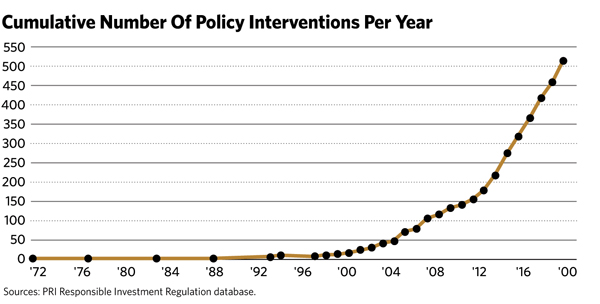The impact of climate change in particular is a risk that many in our industry are sounding alarms about. Larry Fink, the CEO of the world’s largest money manager, BlackRock, took an unmistakable stance in his 2021 letter to CEOs: “There is no company whose business model won’t be profoundly affected by the transition to a net zero economy—one that emits no more carbon dioxide than it removes from the atmosphere by 2050, the scientifically established threshold necessary to keep global warming well below 2 degrees Celsius. … Companies that are not quickly preparing themselves will see their businesses and valuations suffer, as these same stakeholders lose confidence that those companies can adapt their business models to the dramatic changes that are coming.”
BlackRock is not alone in this thinking. European policy makers have arguably led the march to incorporate rules about climate, but the United States is quickly following suit. The Biden administration has made climate risk and ESG top priorities, not just in social arenas but in financial ones. For example, Treasury Secretary Janet Yellen has pledged to put together a team to look at financial system risks arising from climate change, which she refers to as an “existential threat.”
The Principles for Responsible Investment, an international network of investors working to understand and incorporate ESG, tracks regulations pushing investors to consider long-term value drivers such as the sustainability of an investment. Its 2019 update showcases the tremendous increase in the number of policy interventions. (See the graph.)

Investors seem to be listening. Interest in ESG investing has increased dramatically over the last several years, and it’s not just the purview of pensions and endowments anymore.
Sustainable funds pulled in $51.1 billion in net flows in 2020, more than doubling the record set the year before, according to Morningstar’s 2020 “Sustainable Funds U.S. Landscape Report.” Fund flows into these products accounted for nearly one-fourth of overall flows into funds in the United States.
So what should people now expect from the performance of environmental, social and governance investments? Thousands of studies have tried to answer this question. But the truth is that, for the individual advisor or investor putting together a portfolio, there is no correct sweeping answer, particularly since these investments can vary dramatically. More sophisticated approaches—oftentimes not just excluding unwanted companies but more carefully integrating ESG themes to under- and overweight within sectors—can minimize tracking error, making it possible to invest in ESG without betting the farm. There are also thematic investments for certain trends—bets on companies poised to manage well in, say, an age of water scarcity or that will benefit from diversity in their management teams.
The track record on these newer investments is just not long enough to be able to judge empirically. The early evidence is positive, though: ESG funds performed particularly well in 2020 and showed they could reduce investors’ risk. A 2015 meta study conducted by researchers from Deutsche Asset & Wealth Management, the University of Hamburg and the University of Reading, combined the results of about 2,200 studies on ESG and corporate financial performance going back to the 1970s. About 90% showed that ESG didn’t have a negative effect on performance, and the majority of the studies found there was a positive relationship between ESG and performance. Portfolio studies were less positive, however, suggesting that investors using vehicles like mutual funds had not necessarily seen this outperformance.
In a more recent meta study, the NYU Stern Center for Sustainable Business and Rockefeller Asset Management looked at 1,000 papers on ESG done in the last five years. Among the findings was that sustainability initiatives appear to lead to improved risk management and greater innovation.
Governance themes in particular seem associated with positive return and reduced risk. In 2019, MSCI published its own study and found “significant evidence that the application of MSCI ESG Ratings may have helped reduce systematic and stock-specific tail risks in investment portfolios.” MSCI has also begun looking at ESG as its own factor, and early evidence is that its efficacy in explaining stock-specific risk is increasing, possibly because of increased firm investment in sustainability-related measures.
Is recent outperformance the reason money is piling into these investments? Maybe. There’s a shorter-term aspect to the alpha thesis that might also be driving such interest—namely, the desire among investors to simply ride a wave up. Many investors believe that at some point there really is no ESG investing, since such quality considerations would simply become incorporated into people’s analysis the same way other risk considerations are.
In the meantime, as investor preferences for these stocks drive their prices up, investor returns will likely be positive as prices rise to a new equilibrium. So maybe all we have to believe today is that interest in ESG will continue to increase.
Dana D’Auria, CFA, is co-chief investment officer at Envestnet.








